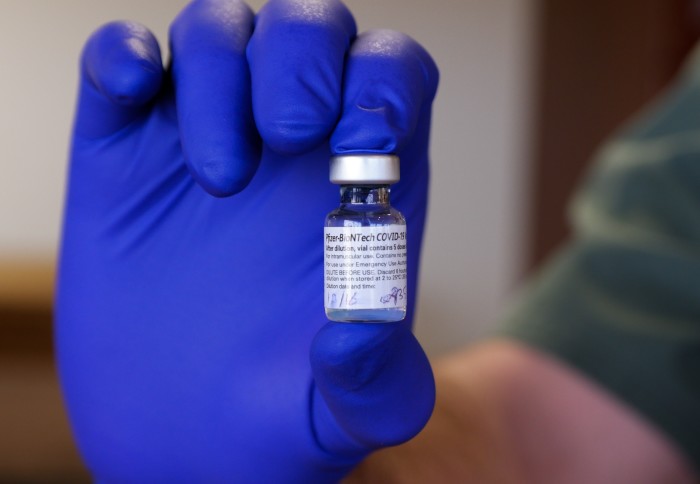Worries over side-effects and testing driving global COVID-19 vaccine hesitancy

Concerns about side effects and whether vaccines have been through enough testing are holding people back from getting vaccinated against COVID-19.
According to a new report based on data from an international survey of 15 countries*, which ran between March and May this year, these were the most commonly cited reasons for not having had a coronavirus vaccine yet, in addition to not being eligible for one.
Respondents’ other commonly reported reasons included concerns about not getting the vaccine they would prefer, and worries over whether the vaccines are effective enough.
"This global survey reveals important insight into why people might not put themselves forward to take a COVID-19 vaccine if offered." Prof Ara Darzi Institute of Global Health Innovation
Led by Imperial College London’s Institute of Global Health Innovation in collaboration with YouGov, the survey also looked at trust in COVID-19 vaccines. Findings from over 68,000 people showed that there is variation across the world but overall, confidence is high with greater than 50% of respondents saying they trust coronavirus vaccines, except in South Korea and Japan (47%). People in the UK are most trusting with almost 9 in 10 saying they trust the vaccines (87%), followed by Israel (83%).
People’s trust in different vaccine brands was also found to vary. Among respondents who hadn’t yet been vaccinated, Pfizer was the most trusted across all age groups in 9 of the 15 countries, and also in the under 65s in three additional countries (Canada, Singapore and Sweden).
The most notable exceptions to this trend were found in countries with high rates of vaccination, namely the UK, US and Israel. People in Israel showed little preference with most under 65s saying they would trust any of the brands listed (AstraZeneca/Oxford, Pfizer, Moderna, Sputnik V and Sinopharm), while the biggest share of over 65s said they wouldn’t trust any of them. Respondents in the US showed the least trust in the different brands, with the largest share of people across all ages saying they don’t trust any of them. 
In the UK, Oxford/AstraZeneca was the most trusted vaccine in the under 65s back in March but confidence has declined over time across all age groups. In most other countries, trust in Oxford/AstraZeneca is low, as with Sputnik V and Sinopharm.
Professor Ara Darzi, co-director of the Institute of Global Health Innovation, said: “Effective COVID-19 vaccination programmes are about demand as much as supply, and this global survey reveals important insight into why people might not put themselves forward to take one if offered. It’s vital that leaders listen to these concerns and address them with urgency so that more people will be willing to accept these life-saving vaccines.”
Do people believe their governments will deliver?
The report is part of a major ongoing effort to monitor changing patterns of health-related behaviours and attitudes during the pandemic. Since April 2020 the researchers have surveyed more than half a million global citizens so that leaders can plan public health responses based on their country’s needs.
"We hope that sharing the concerns people have raised will spur timely and targeted responses from governments." Sarah P. Jones Institute of Global Health Innovation
The most recent survey, carried out with contribution from the WHO working group on measuring behavioural and social drivers of COVID-19 vaccination, shows that confidence in health authorities varies. People in the UK had the most confidence, with 70% believing their government would provide an effective coronavirus vaccine, while South Korea had the least confidence (42%). In five countries, under half said they believe their governments will do so.
Sarah Jones, co-project lead from the Institute of Global Health Innovation, said: “Our programme has been tracking people’s attitudes towards COVID-19 vaccines since November and it’s encouraging to see that trust has steadily been climbing. However our findings show that there is still much work to be done to reassure the public of the safety and effectiveness of coronavirus vaccines.
"We hope that sharing the concerns people have raised will spur timely and targeted responses from governments that will inform and educate the public about the importance of vaccination.”
"This is an opportunity for leaders to respond and help boost confidence in all approved vaccine brands." Melanie Leis Institute of Global Health Innovation
Melanie Leis, co-project lead from the Institute of Global Health Innovation, said: “From our data we can see that people trust different COVID-19 vaccines to different extents. This is an opportunity for leaders to respond and help boost confidence in all approved vaccine brands, enabling vaccination programmes to reach more people and more effectively curb the pandemic.”
Notes
*Countries included in this global comparison are as follows: Australia, Canada, Denmark, France, Germany, Israel, Italy, Japan, Norway, Singapore, South Korea, Spain, Sweden, the United Kingdom and the United States.
Researchers can access the anonymised data through GitHub by clicking here.
Article text (excluding photos or graphics) © Imperial College London.
Photos and graphics subject to third party copyright used with permission or © Imperial College London.
Reporter
Justine Alford
Institute of Global Health Innovation